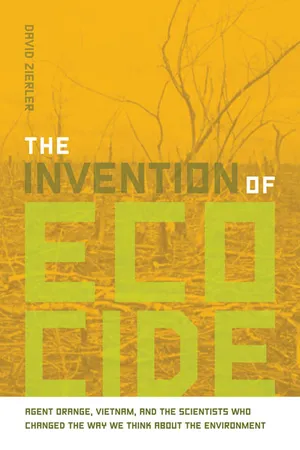
The Invention of Ecocide
Agent Orange, Vietnam, and the Scientists Who Changed the Way We Think About the Environment
- 252 pages
- English
- ePUB (mobile friendly)
- Available on iOS & Android
The Invention of Ecocide
Agent Orange, Vietnam, and the Scientists Who Changed the Way We Think About the Environment
About this book
As the public increasingly questioned the war in Vietnam, a group of American scientists deeply concerned about the use of Agent Orange and other herbicides started a movement to ban what they called "ecocide."
David Zierler traces this movement, starting in the 1940s, when weed killer was developed in agricultural circles and theories of counterinsurgency were studied by the military. These two trajectories converged in 1961 with Operation Ranch Hand, the joint U.S.-South Vietnamese mission to use herbicidal warfare as a means to defoliate large areas of enemy territory.
Driven by the idea that humans were altering the world's ecology for the worse, a group of scientists relentlessly challenged Pentagon assurances of safety, citing possible long-term environmental and health effects. It wasn't until 1970 that the scientists gained access to sprayed zones confirming that a major ecological disaster had occurred. Their findings convinced the U.S. government to renounce first use of herbicides in future wars and, Zierler argues, fundamentally reoriented thinking about warfare and environmental security in the next forty years.
Incorporating in-depth interviews, unique archival collections, and recently declassified national security documents, Zierler examines the movement to ban ecocide as it played out amid the rise of a global environmental consciousness and growing disillusionment with the containment policies of the cold war era.
Frequently asked questions
- Essential is ideal for learners and professionals who enjoy exploring a wide range of subjects. Access the Essential Library with 800,000+ trusted titles and best-sellers across business, personal growth, and the humanities. Includes unlimited reading time and Standard Read Aloud voice.
- Complete: Perfect for advanced learners and researchers needing full, unrestricted access. Unlock 1.4M+ books across hundreds of subjects, including academic and specialized titles. The Complete Plan also includes advanced features like Premium Read Aloud and Research Assistant.
Please note we cannot support devices running on iOS 13 and Android 7 or earlier. Learn more about using the app.
Information
THE INVENTION OF ECOCIDE

CONTENTS
| | ACKNOWLEDGMENTS |
| | ABBREVIATIONS |
| ONE | Introduction |
| TWO | An Etymology of Ecocide |
| THREE | Agent Orange before Vietnam |
| FOUR | Gadgets and Guerrillas |
| FIVE | Herbicidal Warfare |
| SIX | Science, Ethics, and Dissent |
| SEVEN | Surveying a Catastrophe |
| EIGHT | Against Protocol |
| NINE | Conclusion: Ecocide and International Security |
| | NOTES |
| | BIBLIOGRAPHY |
| | INDEX |
ACKNOWLEDGMENTS
ABBREVIATIONS
| AAAS | American Association for the Advancement of Science |
| ABA | American Bar Association |
| ACDA | Arms Control and Disarmament Agency |
| AFB | air force base |
| AFSC | American Friends Service Committee |
| ARPA | Advanced Research Projects Agency |
| ARVN | Army of the Republic of Vietnam |
| AWG | Arthur W. Galston |
| BPI | Bureau of Plant Industry |
| BTI | Boyce Thompson Institute |
| CBW | chemical and biological weapons |
| CCA | Contemporary Culture Archives |
| CDTC | Combat and Development Test Center |
| CIA | Central Intelligence Agency |
| CINCPAC | commander in chief of the U.S. Pacific Command |
| CNI | Committee for Nuclear Information |
| DDT | dichlorodiphenyltrichloroethane |
| DMZ | demilitarized zone |
| DNSA | Digital National Security Archive |
| EWP | Egbert W. Pfeiffer |
| FAS | Federation of American Scientists |
| FRUS | Foreign Relations of the United States |
| GFK | George F. Kennan |
| GPO | Government Printing Office |
| GRFL | Gerald R. Ford Presidential Library |
| GVN | government of Vietnam |
| HAC | Herbicide Assessment Commission |
| IAA | indole-3-acetic acid |
| ICC | International Control Commission |
| ICI | Imperial Chemical Industries |
| ICJ | International Court of Justice |
| IWC | international war crimes |
| JCS | Joint Chiefs of Staff |
| JFKL | John F. Kennedy Presidential Library |
| LBJL | Lyndon Baines Johnson Presidential Library |
| MAAG | Military Assistance and Advisory Group |
| MACV | Military Assistance Command, Vietnam |
| MRI | Midwest Research Institute |
| MSM | Matthew S. Meselson |
| NARA | National Archives and Records Administration |
| NARMIC | National Association on Research of the Military-Industrial Complex |
| NAS | National Academy of Sciences |
| NCI | National Cancer Institute |
| NGO | nongovernmental organization |
| NLF | National Liberation Front |
| NSC | National Security Council |
| PPPUS | Public Papers of the Presidents of the United States |
| RG | record group |
| ROTC | Reserve Officers’ Training Corps |
| RVN | Republic of Vietnam |
| SALT | Strategic Arms Limitation Talks |
| SCFR | Senate Committee on Foreign Relations |
| SCPC | Swarthmore College Peace Research Collection |
| SDS | Students for a Democratic Society |
| SR | Senate Resolution |
| SSRS | Society for Social Responsibility in Science |
| TCDD | 2,3,7,8-tetrachlorodibenzo-para-dioxin |
| TIBA | 2,3,5-triiodobenzoic acid |
| UN | United Nations |
| UNEP | United Nations Environment Programme |
| USAF | United States Air Force |
| USAID | United States Agency for International Development |
| USDA | United States Department of Agriculture |
| VC | Viet Cong |
| VNAF | (Republic of) Vietnam Air Force |
| WBC | War Bureau of Consultants |
CHAPTER ONE
INTRODUCTION
Table of contents
- THE INVENTION OF ECOCIDE